- Home
- Popular Ingredients
- Does Niacinamide Lighten Skin Permanently
Does Niacinamide Lighten Skin Permanently? What to Know & How It Works
Does Niacinamide Lighten Skin Permanently?
Not quite. Niacinamide can brighten your skin and fade dark spots with consistent use—but the results aren’t permanent. If you stop using it, pigmentation may return over time.
💡 Quick Answer:
Niacinamide fades dark spots and brightens skin tone—but results aren't permanent. Stopping use may allow pigmentation to return over time.
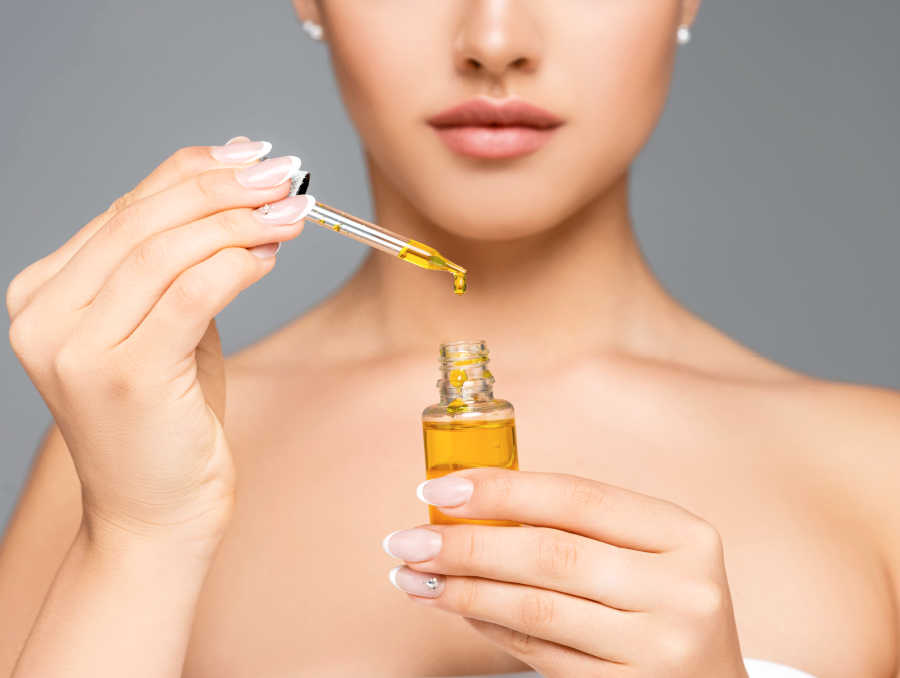 Niacinamide can visibly brighten skin and improve uneven tone with consistent use.
Niacinamide can visibly brighten skin and improve uneven tone with consistent use.Is it really that effective?
Let’s break down how niacinamide works, how long it takes, and how to use it for the best results.
Key takeaways:
- Niacinamide can help brighten the skin and reduce dark spots.
- Application technique matters for the best results.
- Knowing the proper dosage can enhance skin benefits.
What is niacinamide and why is it so popular?
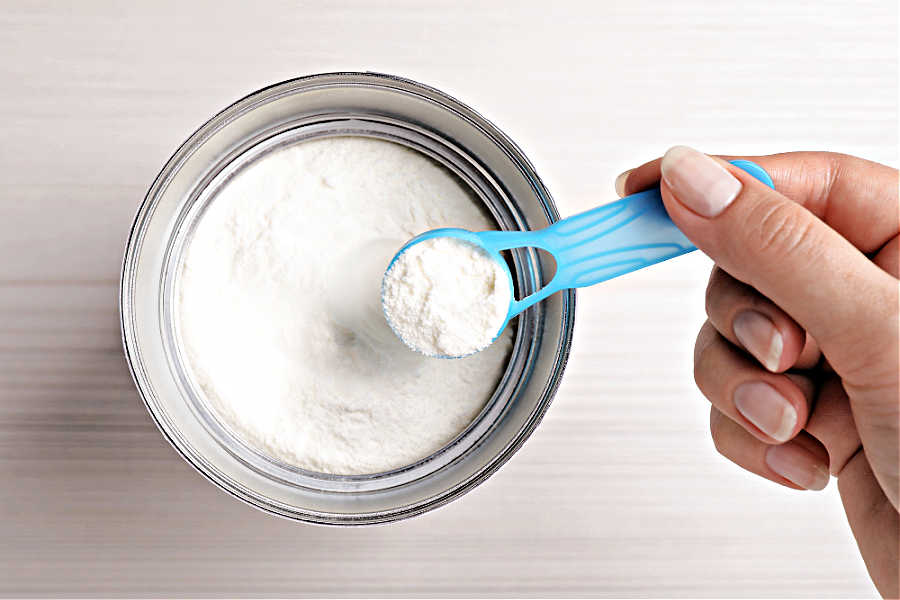
Niacinamide is a form of vitamin B3 that works well for nearly every skin type. It fades dark spots, calms redness, smooths skin texture, and minimizes pores.
It also helps with uneven tone, signs of aging, and sensitivity—making it a go-to for many skincare routines.
Key benefits include:
- Brightening dark spots
- Smoothing fine lines
- Strengthening the skin barrier
- Regulating oil production
- Soothing inflammation
- Antioxidant protection
It strengthens your skin’s barrier by boosting ceramides and lipids, which helps it hold moisture and stay resilient. That’s part of what makes it great for sensitive or dry skin.
Studies published in the British Journal of Dermatology supports these barrier-boosting benefits.
Plus, it has a soothing quality, making it great for calming inflammation and irritation. Overall, it’s a friendly ingredient for my skin!
How it fades dark spots
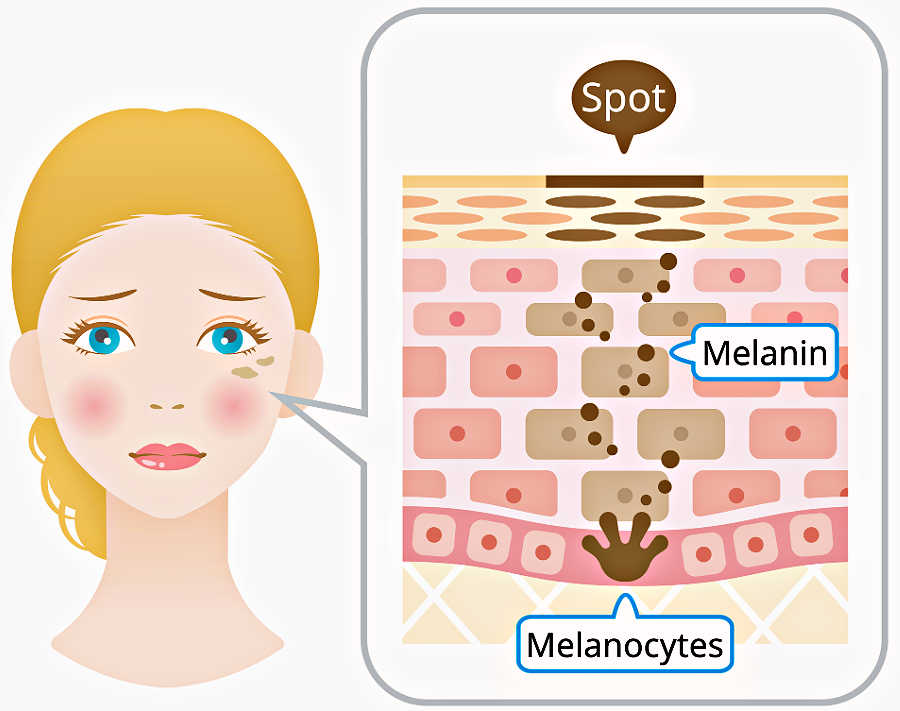 Niacinamide brightens the skin by preventing or reducing the appearance of dark spots.
Niacinamide brightens the skin by preventing or reducing the appearance of dark spots.Niacinamide is a powerful form of vitamin B3 that helps brighten my skin and help tackle dark spots. Here’s how it works:
Slows Melanin Transfer:
Niacinamide helps slow down how melanin, (the pigment that gives your skin its color), moves from the deeper layers of your skin to the surface. That means less extra pigment showing up as dark spots or patches. It’s like putting the brakes on the process that causes uneven skin tone.
Boosts Skin Cell Turnover:
This means it helps your skin shed old, damaged cells a little faster. That’s great news, because once those dull layers are gone, fresh, healthy skin can shine through. Over time, this helps smooth out your tone and fade dark spots.
Note: You can help this process along a mild face scrub, like my DIY sugar scrub for sensitive skin. It can help lift away dead cells and make your skincare products work even better.
By addressing these two areas, niacinamide helps create a more even complexion, making my skin look brighter and more radiant.
How fast does it work
Studies suggest it takes about 4 weeks to see reduced hyperpigmentation and brighter skin. 1
However, based on my own personal experience, it took at least 4 months to see significant lightening of my age spots. Keep in mind that individual responses may vary based on several factors, including:
- Use of other products like vitamin C, kojic acid, or retinols
- Not using sunscreen
- Level of sun exposure
Remember, patience is key when using niacinamide for skin lightening!
Niacinamide vs Vitamin C
Both niacinamide and vitamin C are powerhouse ingredients in skincare, but they work in different ways to improve your skin.
If you're wondering which one is better or if you should use both, the chart below breaks down their benefits, differences, and how they complement each other.
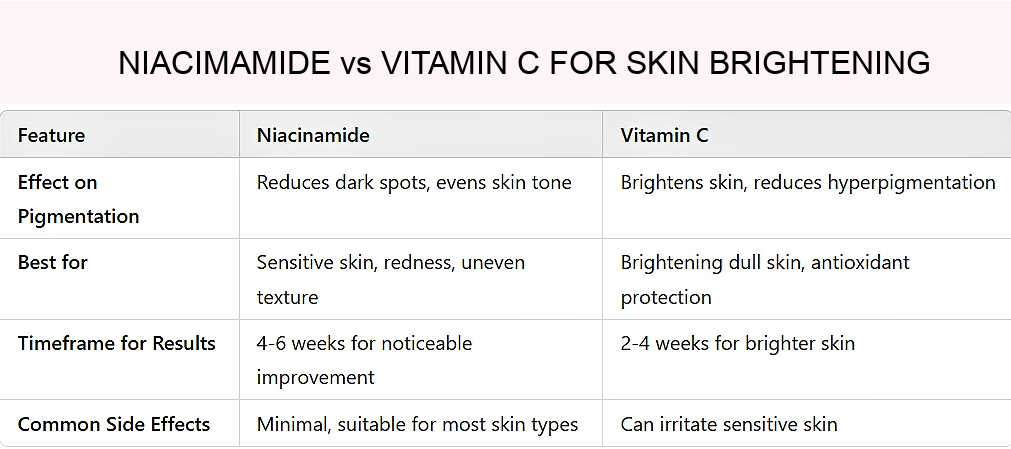
Niacinamide vs Kojic Acid
What if niacinamide alone—or even paired with vitamin C—doesn’t lighten dark spots enough? Adding kojic acid to the mix might be your solution.
How They Work:
- Niacinamide: Stops pigment from rising to the surface of your skin. It’s gentle, reduces redness, keeps skin hydrated, and strengthens the skin barrier.
- Kojic Acid: Inhibits pigment production to fade dark spots. It’s effective but can sometimes irritate sensitive skin.
When Should You Use Both?
- If niacinamide or vitamin C hasn’t worked well enough on its own.
- If you’re ready to commit to daily sunscreen (SPF 30+), since kojic acid increases sun sensitivity.
Quick Comparison:
- Niacinamide: Gentle, great for all skin types, hydrates, and evens skin tone.
- Kojic Acid: Stronger, effective for dark spots, but may irritate sensitive skin.
If you have sensitive skin, niacinamide is a safer choice. For stubborn dark spots, kojic acid works better—just use it carefully! Read more about the benefits of Kojic Acid here.
How to use niacinamide
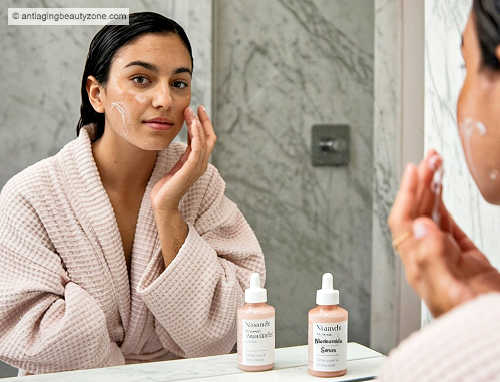 Niacinamide works best when applied consistently to damp skin to improve brightness and fade dark spots.
Niacinamide works best when applied consistently to damp skin to improve brightness and fade dark spots.Niacinamide is available in cleansers, creams, serums, and face masks, and you don't need to use all of them at once.
Here's how to incorporate niacinamide into your routine:
- Pick One Staple Product: If you're new start with a mild cleanser.
- Combine Wisely: Use a niacinamide-based cleanser in the morning and a serum or moisturizer at night.
- Rotate Products: Consider using a niacinamide cleanser in the morning and a serum at night. And use a mask only a few times a week.
Remember, consistency is key, so find a combination that works for your skin without overwhelming it!
Tips for best results
I’ve found that applying niacinamide on damp skin tends to give me the best results. Here’s why this method works well:
- Better Absorption: Since it's water-soluble, applying it to slightly damp skin helps it absorb more effectively. This way, it can dive deep to help brighten.
- Increased Hydration: Niacinamide helps lock in moisture, which is crucial for keeping skin healthy and improving tone and texture.
Trying this can really elevate your skincare game!
Dosage
How much is too much?
As the study above mentioned, to achieve the best results in fading brown spots and overall discoloration, look for niacinamide creams or serums that contain about 2-5%.
However, it's best to start with 2% concentration for a few weeks if you have sensitive skin. If there are no adverse reactions, then, you can increase to 5%.
Note: I bought the niacinamide powder from Amazon and decided to create my own serum to try it out. If you do try it, make sure to get pure niacinamide powder, not the flush free or any altered version.
Myths and facts
Myth 1: Niacinamide is only for oily skin.
- Fact: It benefits all skin types, including dry and sensitive skin.
Myth 2: Niacinamide can't be used with other actives.
- Fact: It pairs well with ingredients like retinol and vitamin C.
Myth 3: Niacinamide works instantly.
- Fact: Results take time, usually a few weeks of consistent use.
Myth 4: The higher the concentration, the better.
- Fact: 2-5% is ideal; higher concentrations may cause irritation.
Myth 5: Niacinamide is only for anti-aging.
- Fact: It also helps with redness, pigmentation, and pore size.
Safety & Side effects
Niacinamide is safe for most skin types—even sensitive skin—especially when used at the right concentration (2–5%).
But like any skincare ingredient, it can cause issues if used incorrectly. I've been there. My skin definitely told me when I overdid it!
Here's what can go wrong:
- Redness or itching
- Dry, tight, or flaky skin
- Breakouts (rare, but possible)
These side effects usually happen when:
- The concentration is too high
- It’s layered with strong acids or exfoliants
- DIY powders aren’t measured properly
How to avoid irritation:
- Start with 2–5% strength
- Don’t mix with strong actives right away
- Patch test—especially with homemade products
- Moisturize well
- Always wear sunscreen during the day
My experience: When I tried making a niacinamide serum using powder and didn’t measure carefully, my skin got dry and tight. Once I adjusted the formula and applied it to damp skin, that tightness went away.
Bottom line: Niacinamide is a safe, effective ingredient—but go slow, use it consistently, and pay attention to how your skin responds.
Takeaway:
Niacinamide is a versatile skincare ingredient that improves hydration, strengthens the skin barrier, and soothes irritation. For best results, follow usage guidelines, keep concentrations low, and listen to your skin’s needs.
Ready to give niacinamide a try? Just remember, results take time and consistency.
Let me know how it works for you, and check out my favorite niacinamide serums or how it compares to kojic acid benefits.
FAQs
Q: Can niacinamide help with skin darkening over time?
Q: Can niacinamide help with skin darkening over time?
A: Yes, with consistent use, niacinamide can help improve skin hyperpigmentation. It works by inhibiting the transfer of melanin to skin cells, which can reduce the appearance of dark spots.
Q: Does niacinamide fade a tan?
Q: Does niacinamide fade a tan?
A: It may help speed up fading by evening out skin tone, but it doesn’t instantly “remove” a tan. Natural skin turnover takes time.
Q: Which is better for brightening skin, niacinamide or vitamin C?
Q: Which is better for brightening skin, niacinamide or vitamin C?
A: Both! Niacinamide is gentler and good for sensitive skin. Vitamin C offers quick brightening and antioxidant protection. Many people use both.
Q: What side effects of using niacinamide?
Q: What side effects of using niacinamide?
A: Most people tolerate niacinamide well, but some may experience mild irritation, redness, or tingling. Stop use and consult a dermatologist if severe irritation occurs.
Question: How long does it take to notice a reduction in dark spots with niacinamide?
Question: How long does it take to notice a reduction in dark spots with niacinamide?
Answer: While results can vary, I’ve seen improvements in dark spots often within 4 to 12 weeks of regular use. Patience is key, and ongoing application usually yields the best results.
Question: Are the skin-brightening effects of niacinamide
permanent?
Question: Are the skin-brightening effects of niacinamide permanent?
Answer: The brightening effects can last as long as I keep using it. If I stop, there’s a chance that pigmentation may gradually return, so ongoing care is essential.
Question: Is niacinamide good for people with oily skin?
Question: Is niacinamide good for people with oily skin?
Answer: Definitely! Niacinamide is great for oily skin types like mine. It helps regulate sebum production. It can also reduce the appearance of pores, making my skin look more balanced.
Question: Can niacinamide bleach the skin?
Question: Can niacinamide bleach the skin?
Answer: Niacinamide is sometimes searched as a skin “bleaching” ingredient, but it doesn’t actually bleach your skin. Instead, it helps fade dark spots and even out tone gradually by slowing melanin production. It’s a safer alternative to traditional skin-lightening products.
Want More?
I share quick routines, beauty tweaks, and what’s working for me — straight to your inbox. Join the Club and get this free Cheek Shaper Video.
About the Author:
Linda Robison is a Facial Fitness Specialist and the founder of Anti-Aging Beauty Zone. With decades of hands-on experience, she shares practical, natural ways to lift and brighten mature skin—without expensive or invasive treatments.
Before you go ....
Please tap on the💙in the bottom right corner if you found this page helpful.
FOLLOW ME FOR MORE TIPS:
SHARE OR SAVE FOR LATER:

